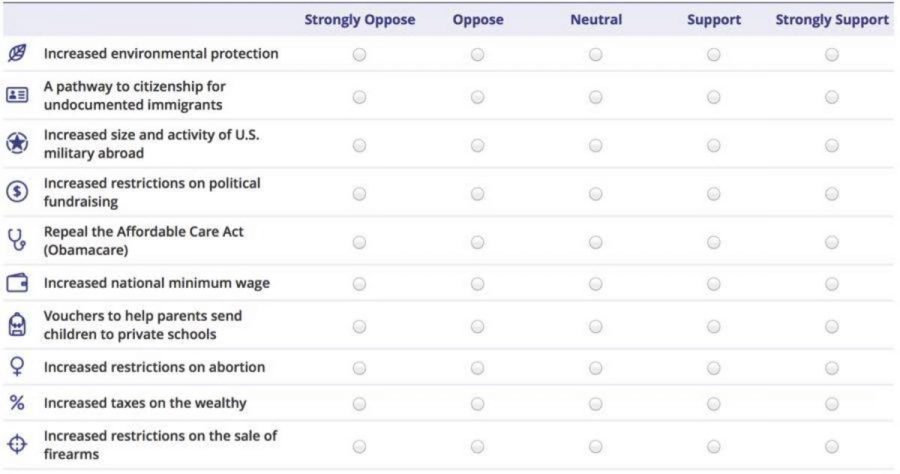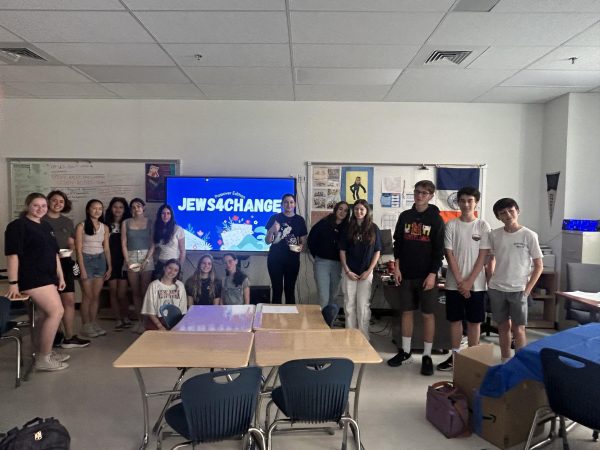Small money, big difference: alums’ website gives citizens new voice
This is the list of questions participants are asked before being matched to candidates. Graphic by Emily Schweitzer.
November 8, 2016
Connecting with the presidential candidates has proven difficult for many Americans this election. To keep people involved in politics, one website is making it easier to support and contribute to key congressional races. Brothers Aaron (‘10) and Daniel Schifrin (‘13) created Swing Donor in 2016, in hopes of giving people the opportunity to make a big impact on competitive political races using small donations.
The brothers, who collaborated with three other Cornell graduates, James Underberg, Austin Gage and Michelle Kurz, started the website after noticing the large role that small money plays in politics. The friends came up with the idea for a website where people can instantly connect to candidates who share their same socio-economic views.
“We want to give people who live in non-competitive election districts an easy way to influence hotly contested federal races,” Aaron Schifrin said. “More broadly, we want to increase the number of small donors donating to House and Senate races by empowering them with the information they need to meaningfully contribute.”
In order to make the website more effective, the creators narrowed the search outcomes to tightly contested elections where the small donations would have the biggest impact. The website focuses solely on congressional elections, not presidential.
“Swing Donor is unique because it’s algorithm will only direct you to tightly contested races,” Daniel Schifrin said. “Automatically, Swing Donor narrows your output to those close races.”
The website’s short, three-step process allows users to easily participate through a 10-question survey regarding how strongly a user feels about particular issues. The responses are matched to candidates with similar views who are in a tight race. Survey questions relate to topics including, but not limited to, the repeal of the Affordable Care Act, size and activity of the U.S. military abroad and restrictions on abortions. After the participants are matched with candidates, they are then presented with the option to donate to those candidates right on the site.
For Daniel Schifrin, it was the Citizen’s United decision and the Bernie Sanders campaign that pushed him to become more interested in small money. For Aaron Schifrin, it was the feeling he had after voting in federal elections and, like his brother, the Bernie Sanders campaign.
“I vote in Maryland and, at least at the federal level, the outcomes of the races I vote in are a foregone conclusion,” Aaron Schifrin said. “I find that incredibly frustrating. My co-founders and I wanted to give people in that position a straightforward opportunity for meaningful civic engagement. We were also very inspired by the Bernie Sanders campaign’s success with small donors.”
This website aims to direct people to where their money will make the most significant impact.
“By donating to A) a tightly contested race and B) a race where issues of importance are furthest apart, it really maximizes your political voice,” Daniel Schifrin said.
Daniel and Aaron Schifrin’s passion for politics sprouted in high school. Aside from growing up in a family energized by politics, the brothers were also members of the debate team and took classes like AP Comparative Politics and AP NSL. For Aaron who majored in Government at Cornell, and Daniel who is currently double-majoring in political science and international relations at Syracuse, this website is just the beginning of their political careers.
Most of all, they hope that their website will inspire as many people as possible to engage in the political process whether by donating to causes or discussing issues.
“We hope the website will encourage small donors to take a more active role in House and Senate races,” Aaron Schifrin said. “We also hope that it fosters a discussion about what, in the absence of structural reform, we can all do to address issues around campaign financing.”







